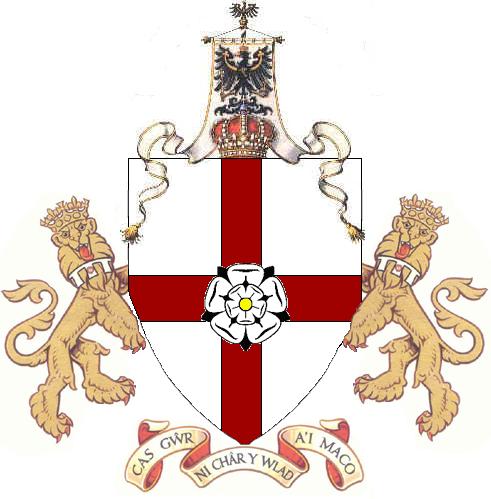Difference between revisions of "Yorkshire-Königsberg"
Britland15 (Talk | contribs) |
Britland15 (Talk | contribs) |
||
| Line 1: | Line 1: | ||
The House of '''Yorkshire-Königsberg''' is the Royal House of the Kingdom of Cascadia. | The House of '''Yorkshire-Königsberg''' is the Royal House of the Kingdom of Cascadia. | ||
| − | [[Image:CoA3.JPG | + | [[Image:CoA3.JPG|right| The house of Yorkshire-Königsberg Coat of Arms. The motto is Welsh for "Hateful the man who loves not the country that nurtures him."]] |
| − | The family split into two branches, the Catholic | + | == History of The House of Yorkshire-Königsberg == |
| + | === Origins === | ||
| + | The family first came to prominence with their creation as Dukes of Yorkshire in 1189. The family advanced over the course of the Middle Ages, being made the dukes of Königsberg in 1563. | ||
| + | |||
| + | The family split into two branches, the Catholic ''Chambers'' and Protestant ''Schofield''. The Chambers branch ruled the area of Yorkshire until their eventual extinction in 1869. The Schofield branch was comparatively more successful ruling over the area of Königsberg. Branches of the Schofield line ascended the throne of Saxe in 1415 and of Altenburg in 1527. The union of these two Schofield lines in 1618 allowed the creation of the Grand Duchy of Saxe-Altenburg in 1701. | ||
| + | |||
| + | In 1869 the vacant duchy of Yorkshire was offered to the Schofield branch of the family. The Schofield family in turn took the secondary surname of Yorkshire-Königsberg. | ||
| + | |||
| + | === The Consolidation of the Cascadian Kingdom === | ||
| + | With the extinction of the house of Victoria the duchy of Vancouver was without a ruler. When the house of Yorkshire-Königsberg ascended to the throne of the tiny pacific duchy, it was in financial ruin and in danger of invaison by the Kingdom of British Cascadia and its Allies. | ||
| + | |||
| + | In response to this pacarious situation duke ''Alexander Schofield Yorkshire-Königsberg'' cut court costs and government spending and created a moderate yet highly efficient military modeled on that of his cousins in Saxe-Altenburg. It was said during this time duke Alexander was living in a house no larger then that of an average noblemen, with most of the palaces and ducal residences sold to raise money for the military and government debt repayment. | ||
| + | {{infobox hrhstyles| | ||
| + | image=[[Image:CoA3.JPG|60px]]| | ||
| + | royal name=The Countess of Wessex| | ||
| + | dipstyle=[[HRH|Her Royal Highness]]| | ||
| + | offstyle=Your Royal Highness| | ||
| + | altstyle=Ma'am|right|}} | ||
| + | |||
| + | Within eight years of duke Alexanders rule he had repaid a substantial portion of the debt, conqured numerous neighbouring states including British Cascadia quadroupling the size of his holdings. | ||
| + | |||
| + | Great grandson of Duke Alexander I, Duke James IV managed to convince tweleve neighbouring states to join in union as the '''Kingdom of Cascadia''' with himself as King of the union. | ||
Revision as of 19:27, 9 June 2006
The House of Yorkshire-Königsberg is the Royal House of the Kingdom of Cascadia.
History of The House of Yorkshire-Königsberg
Origins
The family first came to prominence with their creation as Dukes of Yorkshire in 1189. The family advanced over the course of the Middle Ages, being made the dukes of Königsberg in 1563.
The family split into two branches, the Catholic Chambers and Protestant Schofield. The Chambers branch ruled the area of Yorkshire until their eventual extinction in 1869. The Schofield branch was comparatively more successful ruling over the area of Königsberg. Branches of the Schofield line ascended the throne of Saxe in 1415 and of Altenburg in 1527. The union of these two Schofield lines in 1618 allowed the creation of the Grand Duchy of Saxe-Altenburg in 1701.
In 1869 the vacant duchy of Yorkshire was offered to the Schofield branch of the family. The Schofield family in turn took the secondary surname of Yorkshire-Königsberg.
The Consolidation of the Cascadian Kingdom
With the extinction of the house of Victoria the duchy of Vancouver was without a ruler. When the house of Yorkshire-Königsberg ascended to the throne of the tiny pacific duchy, it was in financial ruin and in danger of invaison by the Kingdom of British Cascadia and its Allies.
In response to this pacarious situation duke Alexander Schofield Yorkshire-Königsberg cut court costs and government spending and created a moderate yet highly efficient military modeled on that of his cousins in Saxe-Altenburg. It was said during this time duke Alexander was living in a house no larger then that of an average noblemen, with most of the palaces and ducal residences sold to raise money for the military and government debt repayment.
| Styles of The Countess of Wessex | |
|---|---|

| |
| Reference style | Her Royal Highness |
| Spoken style | Your Royal Highness |
| Alternative style | Ma'am |
Within eight years of duke Alexanders rule he had repaid a substantial portion of the debt, conqured numerous neighbouring states including British Cascadia quadroupling the size of his holdings.
Great grandson of Duke Alexander I, Duke James IV managed to convince tweleve neighbouring states to join in union as the Kingdom of Cascadia with himself as King of the union.
